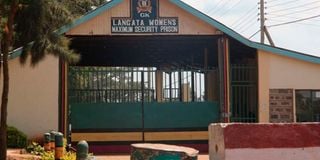Special cells for female terror convicts at Langata Women's Prison

Langata Women's Maximum Security Prison in Nairobi.
Langata Women’s Prison has become the first penal institution in Kenya to host a separate holding block for female terror convicts.
This is after the facility, which has the capacity to hold 12 people, was officially handed to prison authorities by the British Council and a United Nations agency on Wednesday.
The holding block is meant to separate criminals convicted of extremism-related charges, who are considered high risk, from the rest of the general population in efforts aimed at curbing radicalisation at the facility.
It also comes with two guardrooms, and will accommodate the convicts as well as their children.
The block will soon be surrounded by a perimeter wall backed up by two watch towers to ensure maximum security.
The new facility was built after a manual from Kenya's strategy on countering violent extremism, first launched in 2016 by President Uhuru Kenyatta, recommended separating terror suspects at correctional facilities across the country.
The manual recommends their separation be done in a manner that does not dehumanise the convicts' rights as human beings.
As a strategy, this requires careful handling to ensure that violent extremist prisoners do not get to form exclusive groups behind bars, while also ensuring there is no discrimination.
The booklet was produced after the national strategy on countering violent extremism identified prisons and remand centres as hotspots of radicalisation in the country.
Other hotspots include educational and religious institutions, the internet, media and refugee camps.
According to prison officials, the country is currently holding less than 100 terrorism and violent extremism-related convicts in its 129 penal institutions.
Speaking during the handing over ceremony on Wednesday, Deputy British High Commissioner to Kenya Josephine Gauld said the facility was built by the British Council through the United Nations Office on Drugs and Crime (UNODC) at a cost of Sh10.7 million.
“This is very important because we do not want these convicts who have already been radicalised in a range of different settings getting to radicalise other vulnerable prisoners once detained. So we want to keep them separate and run a rehabilitation programme to help them understand what they have done and really think about the consequences of their actions,” she said.
Commissioner General of Prisons Wyclife Ogallo said the block will help with rehabilitation of high risk offenders and called on prison staff to uphold integrity while handling them.
“We’d rather they be hosted where they are not able to radicalize the general population,” said Mr Ogallo.
UNODC also helped with construction of the Kahawa Law Courts, Kenya’s first court dedicated to handling terrorism offences, in partnership with the Kenya Prisons Service.





